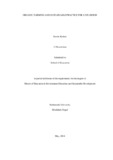
Please use this identifier to cite or link to this item:
https://hdl.handle.net/20.500.14301/275| Title: | ORGANIC FARMING AND SUSTAINABLE PRACTICE FOR LIVELIHOOD |
| Authors: | Karkee, Kavita |
| Citation: | Karkee,K.(2014).“Organic Farming and Sustainable Practice for Livelihood” |
| Issue Date: | May-2014 |
| Publisher: | Kathmandu University School of Education |
| School: | SOED |
| Department: | DODE |
| Level: | Masters |
| Program: | KUMSD |
| Abstract: | This study was carried out with the objective of knowing the perception of owner, farmers (workers) and the consumers regarding organic farming. It was conducted in Trijal Organic Farm, Saanga, Kavre. I have applied interpretative research paradigm. This paradigm offered me to bring the lived experiences of my research participants from the natural setting. I have dominantly used participant observation and in-depth interview to collect information. The participants were selected purposively from this organic farm. The information collected from the field has been analysed by using narrative analysis and the report has tried to incorporate the real narrations told by the research participants as far as possible. The study clearly reveals that farmers are practising organic farming and they believe that this farming system is a good practice. However, the research explores the contradictions on the perception of research participants that organic farming may be a good practice if it increases productivity. As the farm was established as an industry, is earning well and having prestige in the society; organic farming is perceived as a sustainable farming by the owner. However, many challenges need to be faced by the owner from production to marketing. Bio fertilizers and bio pesticides are not easily available. The cost of cultivation is also high as everything vi needs to be done manually requiring more workers. There is a high demand of organic products but the owner is unable to fulfil the demand of the consumers. The consumers are not confident about organic products, whether they are truly organic or not. They are in a dilemma whether or not to trust in the food products that they buy from the organic market. Moreover, the consumers find the price expensive and wish to lower it by the intervention of the government or any other responsible persons or organizations. Though the consumers are not fully confident about organic products and find it expensive; they are willing to purchase some more products other than the products available in the market. Because of the less production, consumers’ access to organic products is also limited. The consumers have perceived that if more people are involved in organic farming then more products will be available in the market and the price will be decreased automatically. Due to lack of sufficient organic foods in the market and being expensive, mainly the well off people, expatriates and some health conscious people have the access to organic product. Knowing the perception of farmers, owner and consumers; organic farming system is environmentally sustainable but it does not seem to be an economically and socially sustainable practice. However, some farmers are interested in taking up organic farming in the near future as they feel that people are becoming more aware of the health benefits of organic products. As there is increased demand of organic products more farmers need to be involved in this farming system. Hence, it shows the possibilities of organic farming in the near future which could contribute to the sustainability of farming system |
| URI: | https://hdl.handle.net/20.500.14301/275 |
| Appears in Collections: | Research Project |
Files in This Item:
| File | Description | Size | Format | |
|---|---|---|---|---|
| thesis final _kavita.pdf | 972.79 kB | Adobe PDF |  View/Open |
Items in DSpace are protected by copyright, with all rights reserved, unless otherwise indicated.